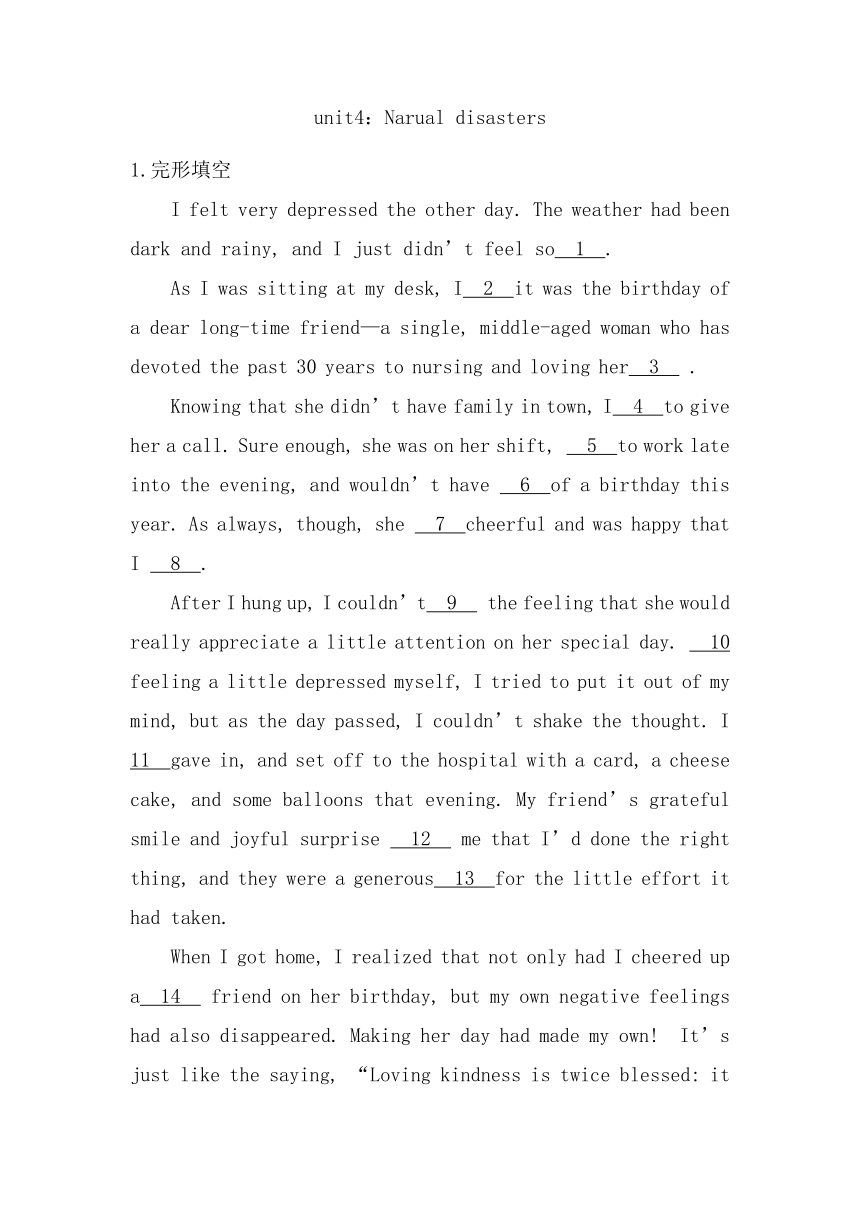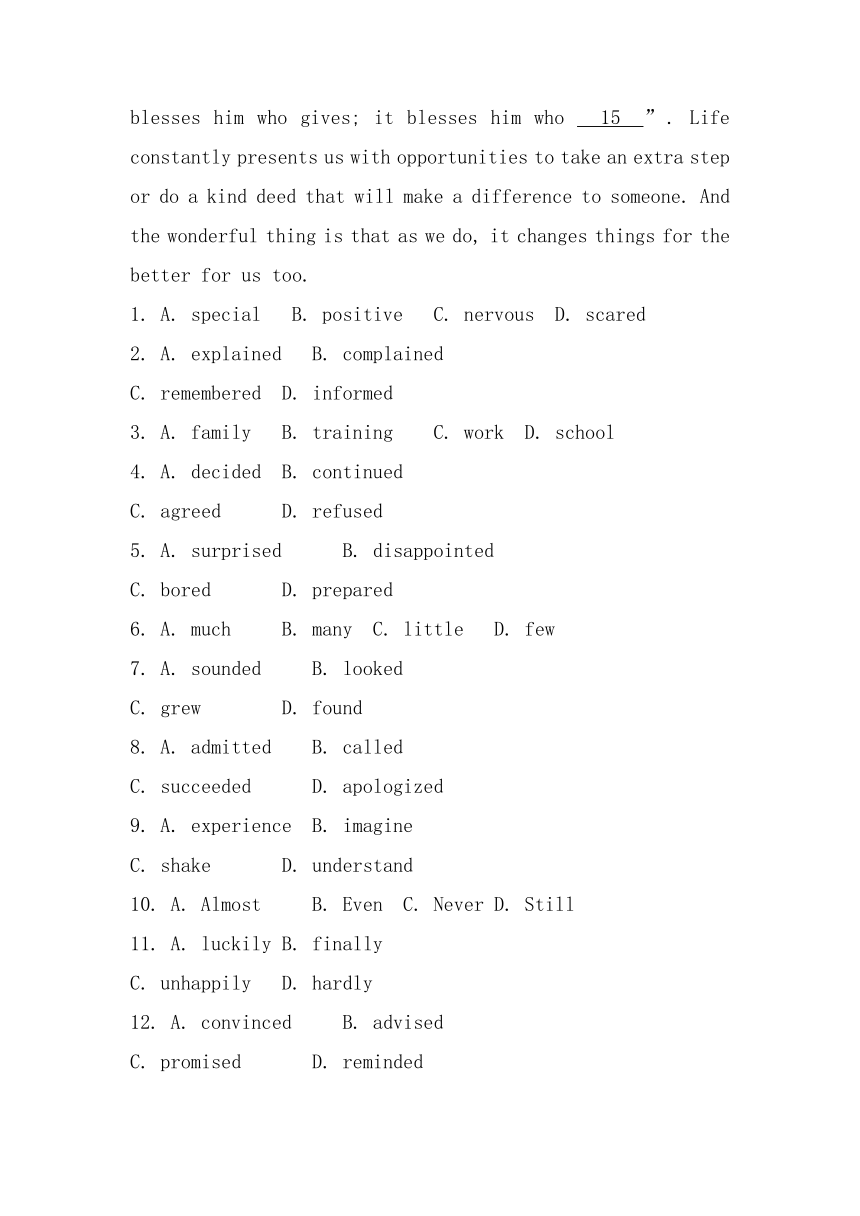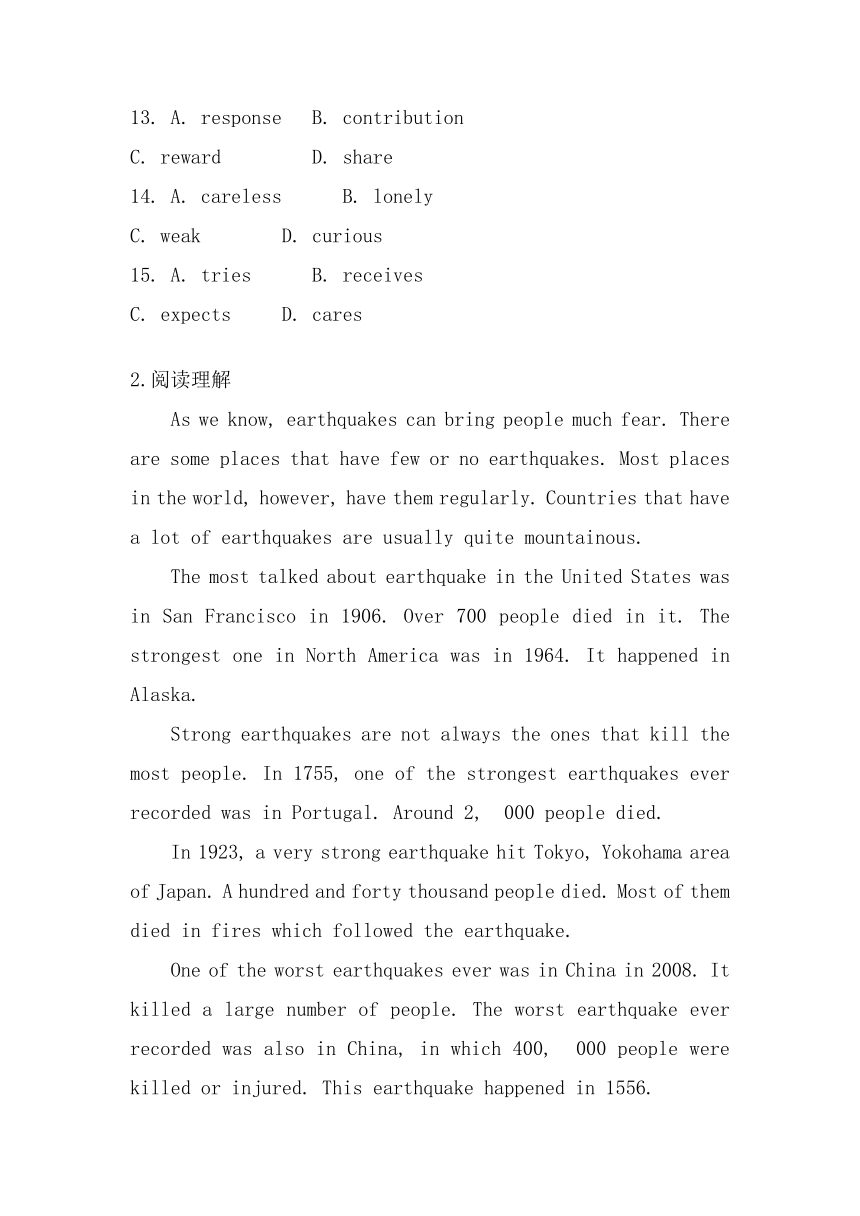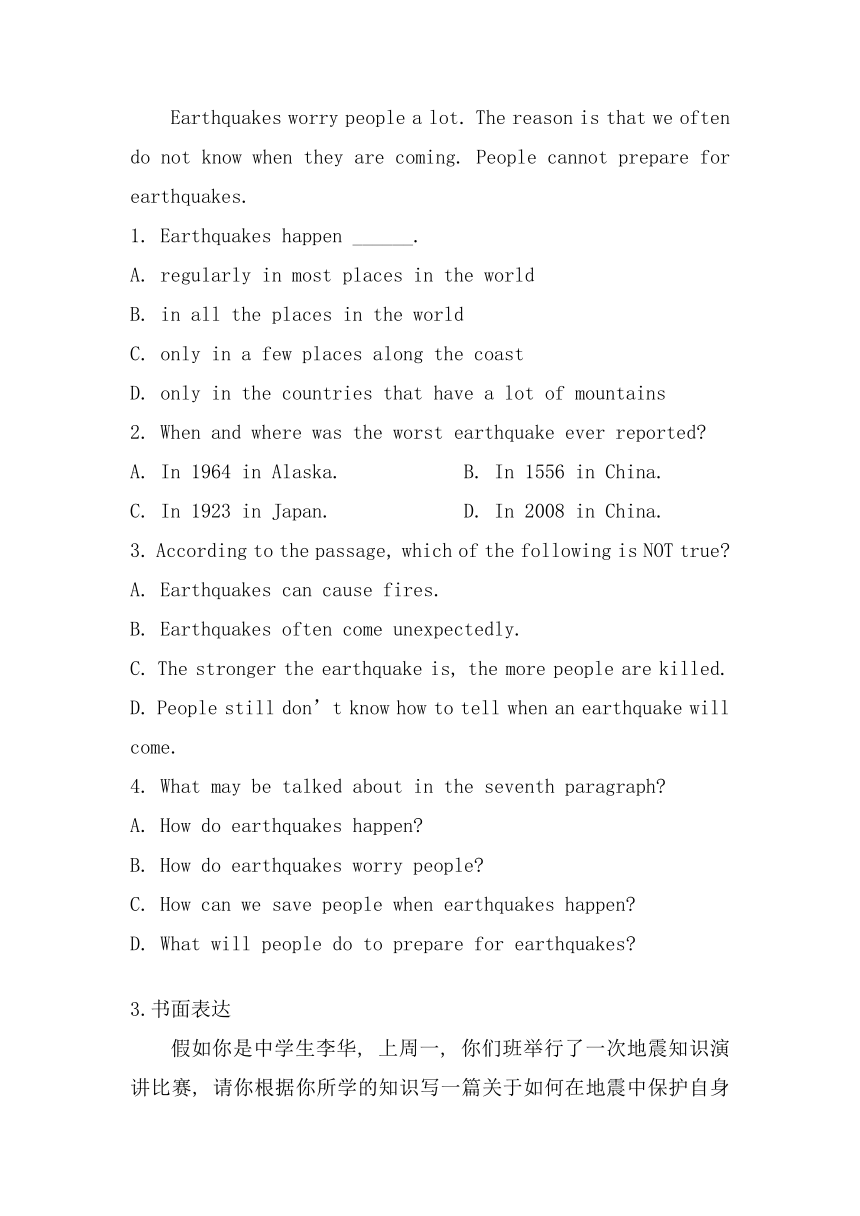2021-2022学年人教版(2019)必修一:Unit 4 Narual disasters 强化练习(含答案)
文档属性
| 名称 | 2021-2022学年人教版(2019)必修一:Unit 4 Narual disasters 强化练习(含答案) |  | |
| 格式 | docx | ||
| 文件大小 | 32.9KB | ||
| 资源类型 | 教案 | ||
| 版本资源 | 人教版(2019) | ||
| 科目 | 英语 | ||
| 更新时间 | 2021-09-04 19:30:10 | ||
图片预览




文档简介
unit4:Narual
disasters
1.完形填空
I
felt
very
depressed
the
other
day.
The
weather
had
been
dark
and
rainy,
and
I
just
didn’t
feel
so 1 .
?
As
I
was
sitting
at
my
desk,
I 2 it
was
the
birthday
of
a
dear
long-time
friend—a
single,
middle-aged
woman
who
has
devoted
the
past
30
years
to
nursing
and
loving
her 3
.
?
Knowing
that
she
didn’t
have
family
in
town,
I 4 to
give
her
a
call.
Sure
enough,
she
was
on
her
shift,
5 to
work
late
into
the
evening,
and
wouldn’t
have
6 of
a
birthday
this
year.
As
always,
though,
she
7 cheerful
and
was
happy
that
I
8 .
?
After
I
hung
up,
I
couldn’t 9
the
feeling
that
she
would
really
appreciate
a
little
attention
on
her
special
day.
10
feeling
a
little
depressed
myself,
I
tried
to
put
it
out
of
my
mind,
but
as
the
day
passed,
I
couldn’t
shake
the
thought.
I
11 gave
in,
and
set
off
to
the
hospital
with
a
card,
a
cheese
cake,
and
some
balloons
that
evening.
My
friend’s
grateful
smile
and
joyful
surprise
12
me
that
I’d
done
the
right
thing,
and
they
were
a
generous 13 for
the
little
effort
it
had
taken.
?
When
I
got
home,
I
realized
that
not
only
had
I
cheered
up
a 14
friend
on
her
birthday,
but
my
own
negative
feelings
had
also
disappeared.
Making
her
day
had
made
my
own!
It’s
just
like
the
saying,
“Loving
kindness
is
twice
blessed:
it
blesses
him
who
gives;
it
blesses
him
who
15 ”.
Life
constantly
presents
us
with
opportunities
to
take
an
extra
step
or
do
a
kind
deed
that
will
make
a
difference
to
someone.
And
the
wonderful
thing
is
that
as
we
do,
it
changes
things
for
the
better
for
us
too.
?
1.
A.
special
B.
positive
C.
nervous D.
scared
2.
A.
explained
B.
complained
C.
remembered
D.
informed
3.
A.
family
B.
training
C.
work
D.
school
4.
A.
decided
B.
continued
C.
agreed
D.
refused
5.
A.
surprised
B.
disappointed
C.
bored
D.
prepared
6.
A.
much
B.
many
C.
little
D.
few
7.
A.
sounded
B.
looked
C.
grew
D.
found
8.
A.
admitted
B.
called
C.
succeeded
D.
apologized
9.
A.
experience
B.
imagine
C.
shake
D.
understand
10.
A.
Almost
B.
Even
C.
Never
D.
Still
11.
A.
luckily
B.
finally
C.
unhappily
D.
hardly
12.
A.
convinced
B.
advised
C.
promised
D.
reminded
13.
A.
response
B.
contribution
C.
reward
D.
share
14.
A.
careless
B.
lonely
C.
weak
D.
curious
15.
A.
tries
B.
receives
C.
expects
D.
cares
2.阅读理解
As
we
know,
earthquakes
can
bring
people
much
fear.
There
are
some
places
that
have
few
or
no
earthquakes.
Most
places
in
the
world,
however,
have
them
regularly.
Countries
that
have
a
lot
of
earthquakes
are
usually
quite
mountainous.
The
most
talked
about
earthquake
in
the
United
States
was
in
San
Francisco
in
1906.
Over
700
people
died
in
it.
The
strongest
one
in
North
America
was
in
1964.
It
happened
in
Alaska.
Strong
earthquakes
are
not
always
the
ones
that
kill
the
most
people.
In
1755,
one
of
the
strongest
earthquakes
ever
recorded
was
in
Portugal.
Around
2,
000
people
died.
In
1923,
a
very
strong
earthquake
hit
Tokyo,
Yokohama
area
of
Japan.
A
hundred
and
forty
thousand
people
died.
Most
of
them
died
in
fires
which
followed
the
earthquake.
One
of
the
worst
earthquakes
ever
was
in
China
in
2008.
It
killed
a
large
number
of
people.
The
worst
earthquake
ever
recorded
was
also
in
China,
in
which
400,
000
people
were
killed
or
injured.
This
earthquake
happened
in
1556.
Earthquakes
worry
people
a
lot.
The
reason
is
that
we
often
do
not
know
when
they
are
coming.
People
cannot
prepare
for
earthquakes.
1.
Earthquakes
happen
______.
?
A.
regularly
in
most
places
in
the
world
B.
in
all
the
places
in
the
world
C.
only
in
a
few
places
along
the
coast
D.
only
in
the
countries
that
have
a
lot
of
mountains
2.
When
and
where
was
the
worst
earthquake
ever
reported?
A.
In
1964
in
Alaska.
B.
In
1556
in
China.
C.
In
1923
in
Japan.
D.
In
2008
in
China.
3.
According
to
the
passage,
which
of
the
following
is
NOT
true?
A.
Earthquakes
can
cause
fires.
B.
Earthquakes
often
come
unexpectedly.
C.
The
stronger
the
earthquake
is,
the
more
people
are
killed.
D.
People
still
don’t
know
how
to
tell
when
an
earthquake
will
come.
4.
What
may
be
talked
about
in
the
seventh
paragraph?
A.
How
do
earthquakes
happen?
B.
How
do
earthquakes
worry
people?
C.
How
can
we
save
people
when
earthquakes
happen?
D.
What
will
people
do
to
prepare
for
earthquakes?
3.书面表达
假如你是中学生李华,
上周一,
你们班举行了一次地震知识演讲比赛,
请你根据你所学的知识写一篇关于如何在地震中保护自身安全的演讲稿。内容要点如下:
1.
在教室时怎样做;
2.
在家时怎样做更安全;
3.
在街上时,
要注意什么。
注意:
1.
词数80词左右;
2.
开头已给出,
不计入总词数。
参考词汇:
balcony(阳台)
What
to
Do
During
an
Earthquake?
As
we
all
know,
an
earthquake
is
a
kind
of
terrible
disaster.
So
what
should
we
do
when
an
earthquake
comes?
__________________________________________
____________________________________________________________________
___________________________________________________________
参考答案:
完形填空
1.B。句意:
天气一直阴沉,
下着雨,
我就是感觉不太舒服。根据空格前的句子可知,
作者心情不好,
positive意为“乐观的”,
符合语境。故选B。
2.C。句意:
当我坐在办公桌前时,
我记得那天是一位老朋友的生日,
她是一位单身的中年女性,
在过去的30年里,
她一直从事护理而且热爱自己的工作。explained解释;
complained抱怨;
remembered记得;
informed告知,
结合语境和下文作者给朋友打电话可知,
当作者坐在办公桌前的时候,
记起了那天是一个老朋友的生日。故选C。
3.C。根据空格前的“who
has
devoted
the
past
30
years
to
nursing”可知,
她从事护士职业30年,
说明她很喜欢自己的“工作”。故选C。
4.A。句意:
知道她在城里没有亲人,
我决定给她打个电话。可知,
作者此时“决定”给朋友打个电话。故选A。
5.D。句意:
果然,
她当时在值班,
准备工作到深夜,
不会有太多的时间过今年的生日。根据前面的“Sure
enough,
she
was
on
her
shift”可知,
她当时在值班,
“准备”工作到晚上。故选D。
6.A。结合上下文可知,
她要工作到深夜,
所以不会有太多的(much)时间过生日。much代词,
此处指代时间。故选A。
7.A。句意:
但是和往常一样,
我打电话的时候,
她听起来很开心。结合上文知道作者是打电话给她的,
所以根据语境可知,
她是“听上去”很高兴。故选A。
8.B。admitted承认;
called
打电话;
succeeded成功;
apologized道歉。前文提到give
her
a
call,
因此该空用动词call表示“打电话”。她很开心作者给她打电话。故选B。
9.C。句意:
挂断电话后,
她一定会感激我在如此特别的日子里给她打电话,
这种感觉挥之不去。根据下文“.
.
.
I
tried
to
put
it
out
of
my
mind,
but
as
the
day
passed,
I
couldn’t
shake
the
thought.
”可知,
这种感觉一直在作者脑中挥之不去。couldn’t
shake
the
feeling表示“某种感觉挥之不去”,
故选C。
10.D。句意:
我自己还是觉得有点沮丧,
我试图把它忘记,
但随着时间的推移,
我无法摆脱这种想法。结合本句中后半部分“我尽力要把它驱散,
但是无法摆脱。”可知,
作者“仍然”感到沮丧,
与文章开头相呼应。故选D。
11.B。句意:
我终于屈服了,
带着一张卡片,
一个奶酪蛋糕,
还有几个气球去了医院。luckily幸运地;
finally终于;
unhappily不开心地;
hardly几乎不。结合上文作者的心情沮丧,
尽力去摆脱这种想法,
但是经过一天的时间,
还是没能摆脱,
所以“最终”屈服了。故选B。
12.A。句意:
我朋友感激的微笑和喜悦的惊喜,
让我相信我做了正确的事,
这是对我付出的小小努力的慷慨回报。convinced使信服;
advised建议;
promised承诺,
答应;
reminded提醒。根据语境可知,
朋友的神情让作者“确信”自己做对了。故选A。
13.C。response回应;
contribution
贡献;
reward回报;
share分享。她的笑容和惊喜使作者确信自己做对了,
这也是对作者慷慨的“回报”。reward符合文意。故选C。
14.B。句意:
当我回到家,
我意识到,
我不仅在一个孤独的朋友的生日当天让她高兴起来,
而且我自己的消极情绪也消失了。由前文的she
didn’t
have
family
in
town可知,
作者的朋友是“孤独的”。故选B。
15.B。句意:
善良是双倍的祝福,
它既祝福给予的人,
也祝福得到的人。
tries试图;
receives接受;
expects期望;
cares关心。根据空格前的gives可知,
应用receives与gives相对应。故选B。
2.阅读理解
1.A。细节理解题。由第一段“Most
places
in
the
world,
however,
have
them
regularly.
”可知,
然而,
世界上大多数地方都经常发生地震。所以地震经常发生在世界上大多数的地方。
2.B。细节理解题。由倒数第二段“The
worst
earthquake
ever
recorded.
.
.
happened
in
1556.
”可知,
有史以来被记载的最严重的地震发生在中国,
有40万人死亡或受伤。这次地震发生在1556年。
3.C。细节理解题。由第三段“Strong
earthquakes
are
not
always
the
ones
that
kill
the
most
people.
”可知,
强烈地震并非总是造成最多人死亡。所以地震越强烈,
死亡的人就越多的说法错误。
4.D。推理判断题。由最后一段中“Earthquakes
worry
people
a
lot.
The
reason
is
that.
.
.
cannot
prepare
for
earthquakes.
”可知,
地震让人们非常担心。原因是我们经常不知道地震什么时候发生。人们无法为地震做准备。那么在第七段就要向人们科普一下人们将为地震做什么准备。
3.书面表达
What
to
Do
During
an
Earthquake?
As
we
all
know,
an
earthquake
is
a
kind
of
terrible
disaster.
So
what
should
we
do
when
an
earthquake
comes?
When
an
earthquake
starts,
students
in
the
classroom
should
get
under
the
desks
immediately
and
wait
until
the
teacher
tells
them
it
is
safe
to
come
out.
However,
for
those
who
are
at
home,
get
immediately
under
the
table
in
the
living
room
or
kitchen.
Don’t
go
anywhere
near
the
window
and
don’t
go
out
onto
the
balcony.
If
you
are
in
the
street
when
an
earthquake
happens,
don’t
stand
near
buildings,
fences
or
walls.
Move
quickly
to
a
large
open
place
to
wait.
Remember
that
standing
under
trees
could
also
be
dangerous.
disasters
1.完形填空
I
felt
very
depressed
the
other
day.
The
weather
had
been
dark
and
rainy,
and
I
just
didn’t
feel
so 1 .
?
As
I
was
sitting
at
my
desk,
I 2 it
was
the
birthday
of
a
dear
long-time
friend—a
single,
middle-aged
woman
who
has
devoted
the
past
30
years
to
nursing
and
loving
her 3
.
?
Knowing
that
she
didn’t
have
family
in
town,
I 4 to
give
her
a
call.
Sure
enough,
she
was
on
her
shift,
5 to
work
late
into
the
evening,
and
wouldn’t
have
6 of
a
birthday
this
year.
As
always,
though,
she
7 cheerful
and
was
happy
that
I
8 .
?
After
I
hung
up,
I
couldn’t 9
the
feeling
that
she
would
really
appreciate
a
little
attention
on
her
special
day.
10
feeling
a
little
depressed
myself,
I
tried
to
put
it
out
of
my
mind,
but
as
the
day
passed,
I
couldn’t
shake
the
thought.
I
11 gave
in,
and
set
off
to
the
hospital
with
a
card,
a
cheese
cake,
and
some
balloons
that
evening.
My
friend’s
grateful
smile
and
joyful
surprise
12
me
that
I’d
done
the
right
thing,
and
they
were
a
generous 13 for
the
little
effort
it
had
taken.
?
When
I
got
home,
I
realized
that
not
only
had
I
cheered
up
a 14
friend
on
her
birthday,
but
my
own
negative
feelings
had
also
disappeared.
Making
her
day
had
made
my
own!
It’s
just
like
the
saying,
“Loving
kindness
is
twice
blessed:
it
blesses
him
who
gives;
it
blesses
him
who
15 ”.
Life
constantly
presents
us
with
opportunities
to
take
an
extra
step
or
do
a
kind
deed
that
will
make
a
difference
to
someone.
And
the
wonderful
thing
is
that
as
we
do,
it
changes
things
for
the
better
for
us
too.
?
1.
A.
special
B.
positive
C.
nervous D.
scared
2.
A.
explained
B.
complained
C.
remembered
D.
informed
3.
A.
family
B.
training
C.
work
D.
school
4.
A.
decided
B.
continued
C.
agreed
D.
refused
5.
A.
surprised
B.
disappointed
C.
bored
D.
prepared
6.
A.
much
B.
many
C.
little
D.
few
7.
A.
sounded
B.
looked
C.
grew
D.
found
8.
A.
admitted
B.
called
C.
succeeded
D.
apologized
9.
A.
experience
B.
imagine
C.
shake
D.
understand
10.
A.
Almost
B.
Even
C.
Never
D.
Still
11.
A.
luckily
B.
finally
C.
unhappily
D.
hardly
12.
A.
convinced
B.
advised
C.
promised
D.
reminded
13.
A.
response
B.
contribution
C.
reward
D.
share
14.
A.
careless
B.
lonely
C.
weak
D.
curious
15.
A.
tries
B.
receives
C.
expects
D.
cares
2.阅读理解
As
we
know,
earthquakes
can
bring
people
much
fear.
There
are
some
places
that
have
few
or
no
earthquakes.
Most
places
in
the
world,
however,
have
them
regularly.
Countries
that
have
a
lot
of
earthquakes
are
usually
quite
mountainous.
The
most
talked
about
earthquake
in
the
United
States
was
in
San
Francisco
in
1906.
Over
700
people
died
in
it.
The
strongest
one
in
North
America
was
in
1964.
It
happened
in
Alaska.
Strong
earthquakes
are
not
always
the
ones
that
kill
the
most
people.
In
1755,
one
of
the
strongest
earthquakes
ever
recorded
was
in
Portugal.
Around
2,
000
people
died.
In
1923,
a
very
strong
earthquake
hit
Tokyo,
Yokohama
area
of
Japan.
A
hundred
and
forty
thousand
people
died.
Most
of
them
died
in
fires
which
followed
the
earthquake.
One
of
the
worst
earthquakes
ever
was
in
China
in
2008.
It
killed
a
large
number
of
people.
The
worst
earthquake
ever
recorded
was
also
in
China,
in
which
400,
000
people
were
killed
or
injured.
This
earthquake
happened
in
1556.
Earthquakes
worry
people
a
lot.
The
reason
is
that
we
often
do
not
know
when
they
are
coming.
People
cannot
prepare
for
earthquakes.
1.
Earthquakes
happen
______.
?
A.
regularly
in
most
places
in
the
world
B.
in
all
the
places
in
the
world
C.
only
in
a
few
places
along
the
coast
D.
only
in
the
countries
that
have
a
lot
of
mountains
2.
When
and
where
was
the
worst
earthquake
ever
reported?
A.
In
1964
in
Alaska.
B.
In
1556
in
China.
C.
In
1923
in
Japan.
D.
In
2008
in
China.
3.
According
to
the
passage,
which
of
the
following
is
NOT
true?
A.
Earthquakes
can
cause
fires.
B.
Earthquakes
often
come
unexpectedly.
C.
The
stronger
the
earthquake
is,
the
more
people
are
killed.
D.
People
still
don’t
know
how
to
tell
when
an
earthquake
will
come.
4.
What
may
be
talked
about
in
the
seventh
paragraph?
A.
How
do
earthquakes
happen?
B.
How
do
earthquakes
worry
people?
C.
How
can
we
save
people
when
earthquakes
happen?
D.
What
will
people
do
to
prepare
for
earthquakes?
3.书面表达
假如你是中学生李华,
上周一,
你们班举行了一次地震知识演讲比赛,
请你根据你所学的知识写一篇关于如何在地震中保护自身安全的演讲稿。内容要点如下:
1.
在教室时怎样做;
2.
在家时怎样做更安全;
3.
在街上时,
要注意什么。
注意:
1.
词数80词左右;
2.
开头已给出,
不计入总词数。
参考词汇:
balcony(阳台)
What
to
Do
During
an
Earthquake?
As
we
all
know,
an
earthquake
is
a
kind
of
terrible
disaster.
So
what
should
we
do
when
an
earthquake
comes?
__________________________________________
____________________________________________________________________
___________________________________________________________
参考答案:
完形填空
1.B。句意:
天气一直阴沉,
下着雨,
我就是感觉不太舒服。根据空格前的句子可知,
作者心情不好,
positive意为“乐观的”,
符合语境。故选B。
2.C。句意:
当我坐在办公桌前时,
我记得那天是一位老朋友的生日,
她是一位单身的中年女性,
在过去的30年里,
她一直从事护理而且热爱自己的工作。explained解释;
complained抱怨;
remembered记得;
informed告知,
结合语境和下文作者给朋友打电话可知,
当作者坐在办公桌前的时候,
记起了那天是一个老朋友的生日。故选C。
3.C。根据空格前的“who
has
devoted
the
past
30
years
to
nursing”可知,
她从事护士职业30年,
说明她很喜欢自己的“工作”。故选C。
4.A。句意:
知道她在城里没有亲人,
我决定给她打个电话。可知,
作者此时“决定”给朋友打个电话。故选A。
5.D。句意:
果然,
她当时在值班,
准备工作到深夜,
不会有太多的时间过今年的生日。根据前面的“Sure
enough,
she
was
on
her
shift”可知,
她当时在值班,
“准备”工作到晚上。故选D。
6.A。结合上下文可知,
她要工作到深夜,
所以不会有太多的(much)时间过生日。much代词,
此处指代时间。故选A。
7.A。句意:
但是和往常一样,
我打电话的时候,
她听起来很开心。结合上文知道作者是打电话给她的,
所以根据语境可知,
她是“听上去”很高兴。故选A。
8.B。admitted承认;
called
打电话;
succeeded成功;
apologized道歉。前文提到give
her
a
call,
因此该空用动词call表示“打电话”。她很开心作者给她打电话。故选B。
9.C。句意:
挂断电话后,
她一定会感激我在如此特别的日子里给她打电话,
这种感觉挥之不去。根据下文“.
.
.
I
tried
to
put
it
out
of
my
mind,
but
as
the
day
passed,
I
couldn’t
shake
the
thought.
”可知,
这种感觉一直在作者脑中挥之不去。couldn’t
shake
the
feeling表示“某种感觉挥之不去”,
故选C。
10.D。句意:
我自己还是觉得有点沮丧,
我试图把它忘记,
但随着时间的推移,
我无法摆脱这种想法。结合本句中后半部分“我尽力要把它驱散,
但是无法摆脱。”可知,
作者“仍然”感到沮丧,
与文章开头相呼应。故选D。
11.B。句意:
我终于屈服了,
带着一张卡片,
一个奶酪蛋糕,
还有几个气球去了医院。luckily幸运地;
finally终于;
unhappily不开心地;
hardly几乎不。结合上文作者的心情沮丧,
尽力去摆脱这种想法,
但是经过一天的时间,
还是没能摆脱,
所以“最终”屈服了。故选B。
12.A。句意:
我朋友感激的微笑和喜悦的惊喜,
让我相信我做了正确的事,
这是对我付出的小小努力的慷慨回报。convinced使信服;
advised建议;
promised承诺,
答应;
reminded提醒。根据语境可知,
朋友的神情让作者“确信”自己做对了。故选A。
13.C。response回应;
contribution
贡献;
reward回报;
share分享。她的笑容和惊喜使作者确信自己做对了,
这也是对作者慷慨的“回报”。reward符合文意。故选C。
14.B。句意:
当我回到家,
我意识到,
我不仅在一个孤独的朋友的生日当天让她高兴起来,
而且我自己的消极情绪也消失了。由前文的she
didn’t
have
family
in
town可知,
作者的朋友是“孤独的”。故选B。
15.B。句意:
善良是双倍的祝福,
它既祝福给予的人,
也祝福得到的人。
tries试图;
receives接受;
expects期望;
cares关心。根据空格前的gives可知,
应用receives与gives相对应。故选B。
2.阅读理解
1.A。细节理解题。由第一段“Most
places
in
the
world,
however,
have
them
regularly.
”可知,
然而,
世界上大多数地方都经常发生地震。所以地震经常发生在世界上大多数的地方。
2.B。细节理解题。由倒数第二段“The
worst
earthquake
ever
recorded.
.
.
happened
in
1556.
”可知,
有史以来被记载的最严重的地震发生在中国,
有40万人死亡或受伤。这次地震发生在1556年。
3.C。细节理解题。由第三段“Strong
earthquakes
are
not
always
the
ones
that
kill
the
most
people.
”可知,
强烈地震并非总是造成最多人死亡。所以地震越强烈,
死亡的人就越多的说法错误。
4.D。推理判断题。由最后一段中“Earthquakes
worry
people
a
lot.
The
reason
is
that.
.
.
cannot
prepare
for
earthquakes.
”可知,
地震让人们非常担心。原因是我们经常不知道地震什么时候发生。人们无法为地震做准备。那么在第七段就要向人们科普一下人们将为地震做什么准备。
3.书面表达
What
to
Do
During
an
Earthquake?
As
we
all
know,
an
earthquake
is
a
kind
of
terrible
disaster.
So
what
should
we
do
when
an
earthquake
comes?
When
an
earthquake
starts,
students
in
the
classroom
should
get
under
the
desks
immediately
and
wait
until
the
teacher
tells
them
it
is
safe
to
come
out.
However,
for
those
who
are
at
home,
get
immediately
under
the
table
in
the
living
room
or
kitchen.
Don’t
go
anywhere
near
the
window
and
don’t
go
out
onto
the
balcony.
If
you
are
in
the
street
when
an
earthquake
happens,
don’t
stand
near
buildings,
fences
or
walls.
Move
quickly
to
a
large
open
place
to
wait.
Remember
that
standing
under
trees
could
also
be
dangerous.
